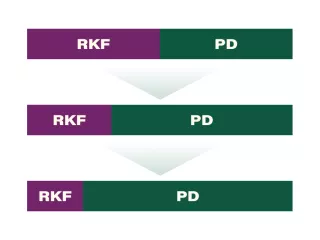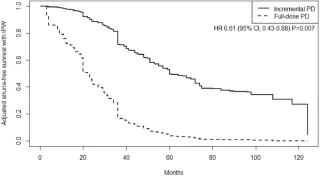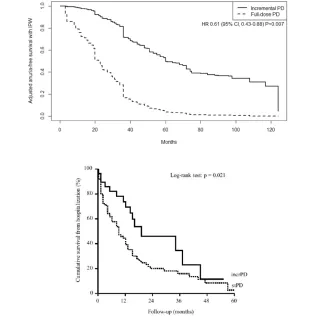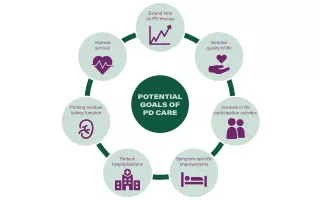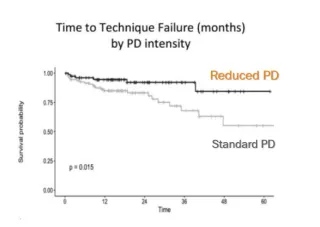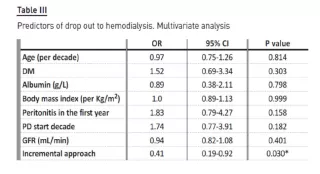
Start Dialysis With Incremental PD
The majority of patients starting dialysis have residual kidney function (RKF) making them suitable for Incremental PD.
“Incremental peritoneal dialysis (IPD) is a strategy by which less than standard “full-dose” PD is prescribed in people initiating PD so that the combination of residual renal and peritoneal clearance achieved is sufficient to achieve individualized clearance goals; it is done with the intention of increasing the peritoneal prescription if and when residual renal clearance subsequently declines”.1
Incremental PD Offers Many Benefits
Study design: A retrospective, randomized study (n=347 patients) between 2007-2015, comparing patients on incremental PD and full dose PD. Primary outcome in the study was anuria-free survival comparing IPD and full dose PD. Inversed probability weighted, adjusted anuria-free survival using time-dependent Cox proportional hazards model. This was an observational, single-center study, which included only CAPD patients with >200mL daily urine volume.
THE TIME IS RIGHT FOR PD
References
-
Peter G Blake et al. Peritoneal Dialysis International 2020, Vol. 40(3) 320–326
-
Baxter Data on File, IPD market research October 30,2019.
-
Sandrini M, et al. Incremental peritoneal dialysis: a 10 year single-centre experience. J Nephrol. 2016;29(6):871-879. doi:10.1007/s40620-016-0344-z. QxMD: https://read.qxmd.com/read/27582136/incremental-peritoneal-dialysis-a-10-year-single-centre-experience.
-
Lee Y, et al. Incremental Peritoneal Dialysis May be Beneficial for Preserving Residual Renal Function Compared to Full-dose Peritoneal Dialysis. Sci Rep 2019: 9, 10105. https://doi.org/10.1038/s41598-019-46654-2
QxMD: https://read.qxmd.com/read/31300708/incremental-peritoneal-dialysis-may-be-beneficial-for-preserving-residual-renal-function-compared-to-full-dose-peritoneal-dialysis. -
Brown EA, et al. International Society for Peritoneal Dialysis practice recommendations: Prescribing high-quality goal-directed peritoneal dialysis. Perit Dial Int. 2020;40(3):244-253. doi:10.1177/0896860819895364 QxMD: https://read.qxmd.com/read/32063219/international-society-for-peritoneal-dialysis-practice-recommendations-prescribing-high-quality-goal-directed-peritoneal-dialysis.
-
Blake PG, Jain AK. Urgent Start Peritoneal Dialysis: Defining What It Is and Why It Matters. Clin J Am Soc Nephrol. 2018;13(8):1278-1279. doi:10.2215/CJN.02820318.
QxMD: https://read.qxmd.com/read/30018049/urgent-start-peritoneal-dialysis-defining-what-it-is-and-why-it-matters -
Bargman JM, Girsberger M. Visions in a Crystal Ball: The Future of Peritoneal Dialysis. Blood Purif. 2018;45(1-3):218-223. doi:10.1159/000485158
QxMD: https://read.qxmd.com/read/29478058/visions-in-a-crystal-ball-the-future-of-peritoneal-dialysis. -
Auguste BL, Bargman JM. Incremental peritoneal dialysis: New ideas about an old approach. Semin Dial. 2018;31(5):
445-448. doi:10.1111/sdi.12712
QxMD: https://read.qxmd.com/read/29806970/incremental-peritoneal-dialysis-new-ideas-about-an-old-approach. -
Ankawi GA, et al. The Use of Incremental Peritoneal Dialysis in a Large Contemporary Peritoneal Dialysis Program. Can J Kidney Health Dis.2016;3:2054358116679131. Published 2016 Dec 13. doi:10.1177/2054358116679131
QxMD: https://read.qxmd.com/read/28781885/the-use-of-incremental-peritoneal-dialysis-in-a-large-contemporary-peritoneal-dialysis-program.
